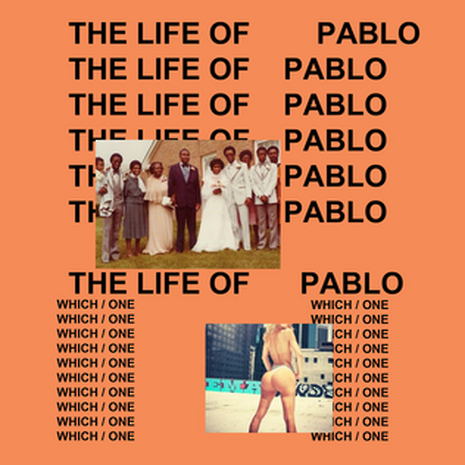Album: Kanye West – The Life of Pablo
Jack Wearing takes a look at Kanye’s seventh album

Chaotic, fragmented, by turns gorgeous and repulsive, The Life of Pablo is Kanye West’s most accomplished self-portrait to date. 2013’s Yeezus punctuated its harsh industrial beats with musical non-sequiturs, placing samples of Nina Simone and church choirs alongside brittle, noisy distortion. His genius on that album resided in his ability to pull together disparate elements into a coherent whole. The Life of Pablo instead revels in its contradictions, jumping from style to style and mood to mood.
The album’s alternate cover art features the words “WHICH / ONE” repeated again and again, inviting us to ask which Pablo Kanye is referencing. In fact, for Kanye, Pablo signifies many aspects of his persona: the artistry of Pablo Picasso, the hedonism and vice of Pablo Escobar, and – as he revealed in a recent tweet – the religiosity of St. Paul. The album’s title went through four different iterations, beginning as So Help Me God, before Kanye settled finally on a title which, through its ambiguity, best represents the many facets of this album and the impulses that guide Kanye’s art and life. Tellingly, Kanye’s first line on The Life of Pablo is “I’m tryna keep my faith”. Kanye is a conflicted man, feeling the strain his work and fame put on his personal relationships, the tension between his desire for a pleasureable life and his newfound responsibility as a parent and husband, and the difficulty of maintaining a spiritual life.
This conflict is musically expressed in a series of stylistic shifts. Ultralight Beam is a gospel track, complete with a choir, a prayer lead by Kirk Franklin, and a moving and complex verse by Chance the Rapper. The religious feeling expressed here and on Low Lights stands in stark contrast to tracks like Freestyle 4, where Kanye takes the abrasiveness he exhibited on Yeezus even further; beginning with a guttural cry (“Rah! Rah! Rah!”), Kanye proceeds to spit staccato bars expressing intense sexual impulses over an ominous beat comprised of eerie strings, distorted vocal samples and frantic drums that eventually decay into a wall of noise.
The portrait Kanye paints of himself on this record is at times far from flattering, with a lower ratio between insightful and asinine lyrics than one might hope. Kanye’s judgement is at times bewildering; it is hard to believe that the man who produced the heartfelt religious sentiment found in the album’s opening is also responsible for the lyrics like “Now if I fuck this model / And she just bleached her asshole / And I get bleach on my T-shirt / I’mma feel like an asshole.” Equally painful is the already infamous line about Taylor Swift on Famous. It’s long been clear that Kanye is possessed of an impulsivity which prevents him from filtering his own speech and behaviour. While this is at times unbearable, it is also what makes his music and his personality so fascinating.
Of course, Kanye is aware of his shortcomings and has suffered their consequences; on Feedback, he raps, “I’ve been outta my mind a long time / I’ve been saying what I feel at the wrong time,” and on ‘Wolves’ he poignantly expresses his regret: “If mama knew now / How you turned out, you too wild.” These candid moments are what keep Kanye relatable, and this album features plenty of them. The standout in this regard is Real Friends, certainly one of the finest songs Kanye has ever written. Over a haunting piano loop and a reverb-heavy drum beat, Kanye reflects on the disintegration of his relationships with family and friends. Here he admits that that he has a tendency to blame others for his problems, but that deep down he knows that he’s responsible: “I’m always blamin’ you, but what’s sad, you not the problem.”
The album proper ends with ‘Wolves’, but after a brief spoken interlude Kanye includes four bonus tracks of varying quality. Built around a killer Chicago house bassline, the closing track Fade is catchy and club-ready but lyrically insubstantial. FACTS is a diss track against Nike that Kanye uses as an excuse to brag about the commercial success of his own shoes and his wife’s Kimoji app. By contrast, No More Parties in L.A. is essential, boasting a classic Madlib beat and a characteristically impressive guest verse from Kendrick Lamar. Best of all is 30 Hours, which finds Kanye reflecting on an old relationship with a mixture of regret and nostalgia over a soulful Larry Graham-sampling beat and backing vocals from Andre 3000.
The Life of Pablo may well be Kanye’s least accessible album; if Kanye’s persona itself doesn’t turn the listener away, the album’s avant-garde leanings and the constant changes in style and tone might be an even greater barrier to their enjoyment. Nonetheless, Kanye has crafted here a powerful statement and another great album, one which expresses with humour and candour the many contradictions in his life and personality.
For another perspective, see Henry Goodwin's review.
 News / Colleges charge different rents for the same Castle Street accommodation2 March 2026
News / Colleges charge different rents for the same Castle Street accommodation2 March 2026 News / News in Brief: waterworks, wine woes, and workplace wins 1 March 2026
News / News in Brief: waterworks, wine woes, and workplace wins 1 March 2026 News / Climate activists protest for ‘ethical careers policy’1 March 2026
News / Climate activists protest for ‘ethical careers policy’1 March 2026 News / Angela Merkel among Cambridge honorary degree nominees27 February 2026
News / Angela Merkel among Cambridge honorary degree nominees27 February 2026 News / Private school teacher who lied about Cambridge degree barred from teaching27 February 2026
News / Private school teacher who lied about Cambridge degree barred from teaching27 February 2026








